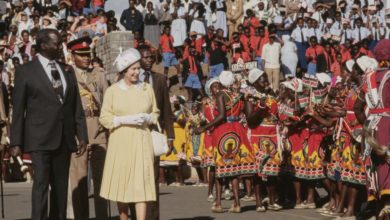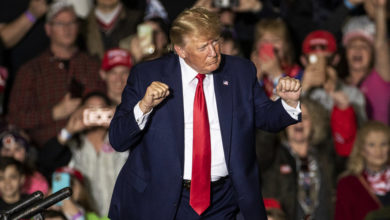Leftist Vies With Tycoon in Colombia’s Presidential Race

BOGOTA — Colombian voters opted for a dramatic change in presidential politics, choosing a leftist former rebel and an outsider populist businessman to advance to a runoff election in June amid hopes a new face can pull them out of the economic damage from the pandemic.
Leftist Senator Gustavo Petro led the field of six candidates Sunday with just over 40% of the votes, while real estate tycoon Rodolfo Hernández, who has no close ties to any political parties, finished second with more than 28%, election officials reported.
These are not the same conservatives and moderates as those who have long governed South American countries.
Petro, the front-runner throughout the campaign, could become Colombia’s first head of state from the left, which for years has been marginalized for its perceived association with the nation’s armed conflict. Hernández, whose showing surprised many, has been compared to former U.S. President Donald Trump for his anti-establishment rhetoric.
They will face off June 19 amid the same polarized environment and growing discontent over increasing inequality and inflation that shadowed the election’s first round. For a candidate to be declared the winner in the initial round of elections, they needed at least 50% of the vote.
Continue reading: Brazil’s Most Popular President Returns From Political Exile With a Promise to Save the Nation
Latin America is witnessing a string of leftist wins as people look for change during a difficult economic time. Chile, Peru and Honduras elected leftist presidents in 2021, and in Brazil, former President Luiz Inácio Lula da Silva is leading the polls for this year’s presidential election. Mexico elected a leftist President in 2018.
Looking at areas where Hernández won in some of Colombia’s most traditional heartland departments, “the rejection of the status quo even among many of the most conservative Colombians…really does show a disgust with the traditional workings of Colombian politics,” said Adam Isacson, an expert on Colombia at the Washington Office on Latin America think tank.

Rodolfo Hernandez supporters follow the outcome of the election night at Bucaramanga in Colombia on May 29, 2022.
Mauricio Pinzon/AP
Petro’s main rival for most of the campaign had been Federico Gutierrez, a former mayor of Medellin who was seen as the continuity candidate and ran on a pro-business, economic growth platform. But Hernández began to move up strongly in recent polls heading into the election.
Petro promises to make major adjustments to Colombia’s economy including tax reform. He also promised to alter Colombia’s approach to fighting drug cartels. Hernández has few connections to political parties and promises to reduce wasteful government spending and to offer rewards for people who report corrupt officials.
“What is in dispute today is change. The political parties allied to the government of (incumbent Ivan) Duque, his political project, has been defeated in Colombia,” Petro told his supporters as they celebrated at his campaign headquarters in Bogotá. “Colombia’s total vote launches that message to the world: A period is ending; an era is ending.”
Hernández, in a livestream after early results showed he advanced to the runoff, said he remains firm on his commitment to end “corruption as a system of government.”
Continue reading: There’s No Easy Way Out of This.’ How Anti-Government Protests in Colombia Escalated into Deadly Clashes with Police
“Now, we enter the second period, and these next few days will be decisive in determining the future of the country,” he said.
The election was the second since 2016 when the government had signed a peace accord with the Revolutionary Armed Forces of Colombia (FARC) for the initials. However, this divisive deal was not an issue in the campaign. The focus of the campaign was instead on poverty, inflation, and other problems exacerbated because the pandemic.
It is Petro’s third attempt to become president. Duque won the election in 2018, defeating Petro, who wasn’t eligible to run for reelection.
In a sign of the resistance to a leftist government, Gutierrez endorsed Hernández shortly after he failed to advance to the runoff.
“Knowing that our position is decisive for the future of Colombia, we have made a decision … we do not want to lose the country,” Gutierrez said, adding that he would support Hernández because he does not want to put Colombia “at risk.”
Petro was once an insurgent with the now defunct M-19 movement. He was jailed for being involved with the group and received amnesty.

Wayuu Indians arrive in Colombia to cast votes in the 2022 presidential election in Uribia, Colombia. This was May 29th 2022.
Lismari Machado—Anadolu Agency/Getty Images
Hernández, the former mayor of the north-central city of Bucaramanga, surged in recent polls with promises to “clean” the country of corruption and to donate his salary. There is a connection, some believe, between Hernandez and Trump.
“They share that they have speeches against the establishment, against that traditional policy, not only seen from the government, but from the traditional opposition,” said Johan Caldas, a political analyst at Universidad de la Sabana. “They are far from any type of structure, from formalisms, from partisan thoughts that end up precisely convincing people, who find an option for change, that is just far from the traditional left or right.”
Gallup conducted a poll earlier in the month and found that 75% believed Colombia is headed in the wrong direction, while only 27% favored Duque.
Covid and inflation changes Colombian politics
The pandemic set back the country’s anti-poverty efforts by at least a decade. Official figures show that 39% of Colombia’s 51.6 million residents lived on less than $89 a month last year, which has a slight improvement from 42.5% in 2020.
The 9.2% level of inflation reached its peak in the past two decades.
“The vote serves to change the country and I think that this responsibility falls a lot on young people who want to reach standards that allow us to have a decent life,” said Juan David González, 28, who voted for the second time in a presidential election.
Duque’s successor will also have to decide whether to resume peace talks the Duque suspended with the National Liberation Army, a guerrilla group founded in the 1960s. FARC dissidents and the Gulf Clan cartel will be another source of violence for the president.
And, corruption is on many Colombians’ minds.
“Corruption in state entities is the main problem in the country,” said voter Édgar González in Bogotá. “… A very big change is taking place in the country’s politics and if we all exercise the right we are going to achieve that change.”
Here are more must-read stories from TIME





